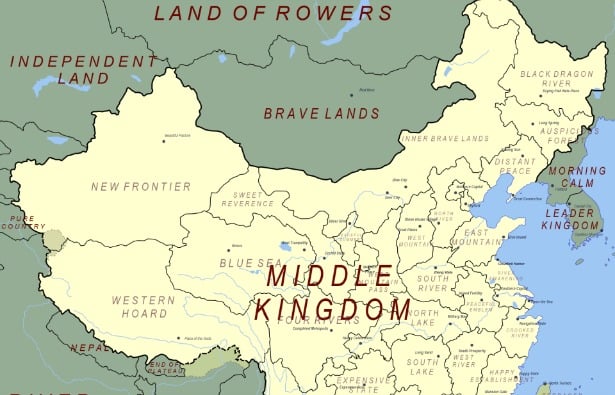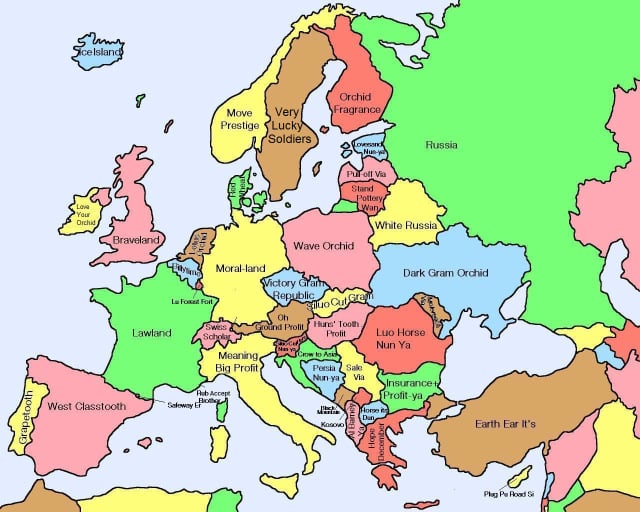Chinese Gone Wrong: Amusing Translations of Country Names
Language is a funny a thing. Each different language is able to describe the world around us, from naming concrete objects to abstract concepts, giving us the means to communicate. Yet translating between languages is not a straightforward task. Literal translations show up the gaps between languages and the subtleties inherent in linguistics. Google translate’s often humorous translations is proof of the difficulty of trying to translate without context. Of all languages, Chinese is probably the most difficult to translate literally.
What accounts for this added level of difficulty in translating Chinese is the way it is structured. Chinese works with characters, or hanzi in Mandarin. There are literally tens of thousands of characters in Chinese, and what makes them remarkable is that the characters don’t necessarily correspond either to a word or a letter (in the same sense as the Roman alphabet). Instead, characters can be a syllable, a word or a phrase. Moreover, the same character may have different meanings, according to how it is pronounced.
So one word is often made up of numerous characters, which when translated literally, character by character, can mean something entirely different to the word as a whole. This is demonstrated very clearly when looking at the literal translations of country names.
Europe Translated Literally
Table of Contents
Photo via haonowshaokao
Blogger Haonowshaokao demonstrated this translation quirk by compiling a map of Europe using the country names translated literally from Chinese. The result? Some wonderful translations such as “Braveland” for England, “Lawland” for France, “Love Your Orchid” for Ireland, “Hope December” for Greece, “Grapetooth” for Portugal and “Meaning Big Profit” for Italy.
He told Buzzfeed that he got to these names by translating the names character for character, something which wouldn’t make sense to Chinese people who know that the characters need to be read together for the word to have proper meaning.
Expanding from this map, other places around the world have equally wonderful translations. Through this character-for-character translation, the United States becomes “Beautiful Country”, North Korea ironically translates to “Morning Calm”, while South Korea is “Leader Kingdom” and Afghanistan amusingly becomes “Abundant Sweat.”
China, Translated
Translating a map of China and its provinces proves just as entertaining. One of China’s poorest provinces, Guizhou becomes “Expensive State” while the landlocked Qinghai Province translates as “Blue Sea.” Another province, Chongqing, is “Double Celebration” in English and Gansu becomes “Sweet Reverence.” Perhaps the most interesting is Liaoning Province, which borders North Korea, is translated as “Distant Peace.”
It is important to stress that these translation don’t reveal what the word actually means in Chinese, since this way of translating is essentially meaningless in terms of carrying across the concept and context.

Photo via The Atlantic
The rise of Chinglish
These translations of country names are what is considered, according to International Business Times, Chinglish. This term is used to describe the literal, and very out-of-context, translations from Chinese into English, using characters or phonetics rather than meaning. Chinglish is what is responsible for the often hilarious translations of signs, postings and menus that English-speaking people find so amusing when travelling in China.
Some of these make little sense, such as McDonald’s (Maidanglao in Chinese) which translates as “wheat labour.” Of course, there are ways to use these translations to one’s advantage. When Coca-Cola first entered China, their phonetically similar word meant “bite the wax tadpole” or “wax-flattened mare”. Not really the image the brand was going for. They then changed it to Kěkǒukělě which sounds similar to Coca-Cola and means “pleasurable to the mouth” – certainly a better translation!
There are many more weird and wonderful translations of Chinese expressions such as “horse horse tiger tiger” to say something is so-so, “electric brain” for a computer, suffer becomes “eating bitterness” and “wear a green hat” is the translation for being cheated on. What is abundantly clear is that literal translations from Chinese, while amusing and amazing, do not offer much meaning.
This is after all a crucial lesson for language learners to not translate directly from one language to another. Even with a language that is not as difficult and complex as Chinese. Languages are constructed very differently, and with a totally different thought process.
***
Don’t let the complexity of Chinese stop you from learning this ancient language. Chinese is, after all, the most widely spoken language in the world making it well worth your time. Join the masses and find a Chinese course near you today!



